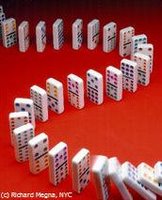Thursday, December 21, 2006
Monday, December 18, 2006
The Presses Are Rolling - All Over Us
 I understand that newspapers are losing readership to electronic
media, but I also hear that newspaper publishers everywhere are
being bid for at rising prices. What is going on?
I understand that newspapers are losing readership to electronic
media, but I also hear that newspaper publishers everywhere are
being bid for at rising prices. What is going on? Freedom of the press has been the approved moral position of our culture for centuries. During those same years, however, monopolization of the press &mdash which began with moveable type and now charges ahead in this mystifying time of digital "yes" and "no" &mdash has had its loyal supporters.
In the sea of media in which we are engulfed, there is an endless supply of such contradictory stances. We have mounting evidence of the dreadful cost to society of obesity, together with increasingly skillful manipulation of our eating habits by advertising agencies (in the direction of more calories). We witness encroaching centralized control of media, and simultaneously unfettered freedom for individuals, as exemplified by this very blog (among millions). We are lectured to by those who would guide us to financial freedom through prudent savings, and we are overwhelmed by vendors promising us: "Buy now, and don't pay anything for 12 months!"
Free enterprise and freedom of the press must mean that we are free to read, to look, to listen, to do whatever we like. No doubt there are some who turn everything off as they go about their mental lives, but they are indeed few. Most of us abhor silence, and welcome input. When forced to wait, we pick up something to read or listen to or even to watch. Of course, it must be our own fault if, in so doing, we invite pressures on ourselves &mdash or is it?
Philosophize as we will, in the meantime the free presses are rolling, and rolling all over us. All this begs the question: Are we as "free" as they are? That should make us think. At least we are still free to do that &mdash the last time I checked.
Friday, December 15, 2006
Words Of Wisdom
 Recently, I bought a book at a temporary stall set up in the
entrance to a
Salvation Army
hospital. It cost $11.99, and in retrospect I should have bought
more of their books. It is called "8000 Things You Should Know",
and thanks to
plagiarism,
it could supply blog material for as long as I live.
I suppose not all 8000 will be "words of wisdom", but undoubtedly
some of them will. In the spirit of that book, here are
a few other insightful (and pithy) remarks. These are taken
from an old clipping of unknown origin, and I hereby borrow them
for "my" column.
Recently, I bought a book at a temporary stall set up in the
entrance to a
Salvation Army
hospital. It cost $11.99, and in retrospect I should have bought
more of their books. It is called "8000 Things You Should Know",
and thanks to
plagiarism,
it could supply blog material for as long as I live.
I suppose not all 8000 will be "words of wisdom", but undoubtedly
some of them will. In the spirit of that book, here are
a few other insightful (and pithy) remarks. These are taken
from an old clipping of unknown origin, and I hereby borrow them
for "my" column.
- Mark Twain: Golf is a good walk spoiled.
- Lily Tomlin: The trouble with the rat race is that even if you win, you are still a rat.
- Groucho Marx: Military intelligence is a contradiction in terms.
- Voltaire: The art of medicine consists in amusing the patient while nature cures the disease.
- Gioacchino Rossini: How wonderful opera would be if there were no singers.
- John Ciardi: There is nothing wrong with sobriety in moderation.
- Woody Allen: I took a speed reading course and read "War and Peace" in 20 minutes. It involves Russia.
- Dorothy Parker: Brevity is the soul of lingerie.
- G.K. Chesterton: To be clever enough to get a great deal of money, one must be stupid enough to want it.
Wednesday, December 13, 2006
Age Equals Incompetence, Right?
I have written before about the tendency of people to regard me as changed since I am over 90. Some of those closest to me are among this lot. I do observe that I drive more carefully now, but this is because I want to avoid any discussion with the authorities about age if I commit some tiny infraction. I accept that eventually time conquers all, but I also know that individual schedules are hard to predict.
Composers create music, and musicians give concerts well into their late eighties. We see people of that "ripeness" completing marathons, even if not winning them any longer. Writers and scientists do very well at similar ages. Understanding accumulates, I think — I was party to matters in my fifties that I am too "smart" to touch now. The "been there, done that" flavour of wisdom does not suffer with the passage of time.
Some societies, as termites and primitive human groups, pool their learned and instinctive behaviour, acting as the group "knows" how to act, often avoiding pitfalls thereby (sometimes literally). This collective wisdom is passed down from generation to generation, a group inheritance of sorts. However, it is difficult to find examples of such complete cooperation in our Western society, or of such attention being paid to the knowledge of elders. In the rush of modern culture, is the voice of the older individual still heard?
Sunday, December 10, 2006
In Mourning, Among Her Souvenirs
 My first wife, as I have always reminded her she is, is in the
hospital, and has not been home for over eight weeks. She has had
many ongoing medical conditions, from hereditary thyroid deficiency
to Type 2 diabetes. Her heart efficiency is about 30% after
a heart attack in October, and now her blood sugar levels call for
monitoring and readily available insulin. And what can I say
about myself other than that I am in mourning?
My first wife, as I have always reminded her she is, is in the
hospital, and has not been home for over eight weeks. She has had
many ongoing medical conditions, from hereditary thyroid deficiency
to Type 2 diabetes. Her heart efficiency is about 30% after
a heart attack in October, and now her blood sugar levels call for
monitoring and readily available insulin. And what can I say
about myself other than that I am in mourning? Here I am, in a home where I am surrounded by her choices of nearly everything I look at. As you come in the front door, a lovely big bowl of fake flowers greets you, and the walls have her framed selections, some of family memories. In the off-kitchen eating area &mdash as we have eliminated a definite dining room &mdash the wall decorations range from extremely good to great, and the junk in the adjoining kitchen is definitely OK. In short, Margaret Hilda MacLeod Crowdis, my present wife, is just everywhere.
In the middle of the night, I am careful when I get up for drainage purposes, so as not to disturb her who is not there. In the morning, I always come downstairs early to read the papers, and can't help thinking about her preferences for breakfast. Since I am almost 93, what do you think I think of during those early hours but the future, and what on earth (good expression) I can do about it?
Between missing Margie, and wondering when we will again share the same residence, I am simply reduced to this: I am in mourning among her souvenirs.
Thursday, December 07, 2006
We Begin To Die ...
 As I am contemplating my 93rd birthday this coming Christmas Eve,
my thoughts are, of course, on life with all its mysteries, and
on death with some mysteries of its own. As has been said,
"If we knew all about anything, we would know all about everything".
I am still alive, but not as "alive" as I once was, and I realize
that this process has been gradual and inexorable. As I approach
death, I ask questions concerning when I was most alive, and I have
reason to think it was just following
that
lucky sperm being allowed into that lucky egg.
The speed of division and specialization was never so great again.
I am very aware that my cell replication and repair processes
are still slowing, and that this can only result in something vital
not happening, or not happening correctly enough. Then I will,
for the record, die, although many of my tissues will be sufficiently
alive to be usable by a lucky, compatible, somebody. This is a
fascinating thought, that parts of me might "live" after I have
died.
As I am contemplating my 93rd birthday this coming Christmas Eve,
my thoughts are, of course, on life with all its mysteries, and
on death with some mysteries of its own. As has been said,
"If we knew all about anything, we would know all about everything".
I am still alive, but not as "alive" as I once was, and I realize
that this process has been gradual and inexorable. As I approach
death, I ask questions concerning when I was most alive, and I have
reason to think it was just following
that
lucky sperm being allowed into that lucky egg.
The speed of division and specialization was never so great again.
I am very aware that my cell replication and repair processes
are still slowing, and that this can only result in something vital
not happening, or not happening correctly enough. Then I will,
for the record, die, although many of my tissues will be sufficiently
alive to be usable by a lucky, compatible, somebody. This is a
fascinating thought, that parts of me might "live" after I have
died. Taken all together, though, I would choose to stay here &mdash in one piece and in good shape, of course &mdash indefinitely longer. I would not object to being the oldest human on the planet by a hundred years or so. Or would I? Some things, like sex and good food, might lose their sensory appeal altogether. In any case, this is not my decision to make. We cannot reverse, or even alter, the arrow of time. Tissues will repair more slowly and less perfectly, and eventually some tissue we need will fail entirely. As we slow, we prepare to die, and then we do.
Sunday, December 03, 2006
Thomas Edison Was Deaf, Wasn't He?
 It is well known that
Thomas Edison
was deaf, but later in life, when he was famous (to say the least),
a specialist told him that it might be possible to repair his
hearing. However Edison declined the offer, saying that this way
he could hear when he wanted to hear (and sometimes he heard things
to his advantage that others obviously did not intend for him to hear).
It was a sort of tranquility on demand.
It is well known that
Thomas Edison
was deaf, but later in life, when he was famous (to say the least),
a specialist told him that it might be possible to repair his
hearing. However Edison declined the offer, saying that this way
he could hear when he wanted to hear (and sometimes he heard things
to his advantage that others obviously did not intend for him to hear).
It was a sort of tranquility on demand. This brings up several questions in matters of morality, of ethics. Was this honest, to pretend what was not (entirely) so? How many of us tell others everything we know? Should we, no matter how we acquire information? Why was Edison permitted to be left alone to work productively because of his "affliction", when otherwise his time (like ours) might have been taken up by someone wanting to sell him some thing or some idea?
To be sure, it was sneaky, but who isn't? As Jesus said, "Let him who is without sin cast the first stone". Now think of all that Edison accomplished — and of the thousands of things he tried that did not succeed, which he viewed as successful because he wouldn't try them again. Apparently, Edison did not regard himself as lonely, for he could communicate with others when he cared to. Another famous man who valued being left along was Alexander Graham Bell, who often spent weekends on his houseboat to get away from the telephone.
My title is a question, and the answer is: Define "deaf". Hearing, like sight, mobility, and health in general, is so involved with other considerations that we can only say, as in most matters, "it depends".



